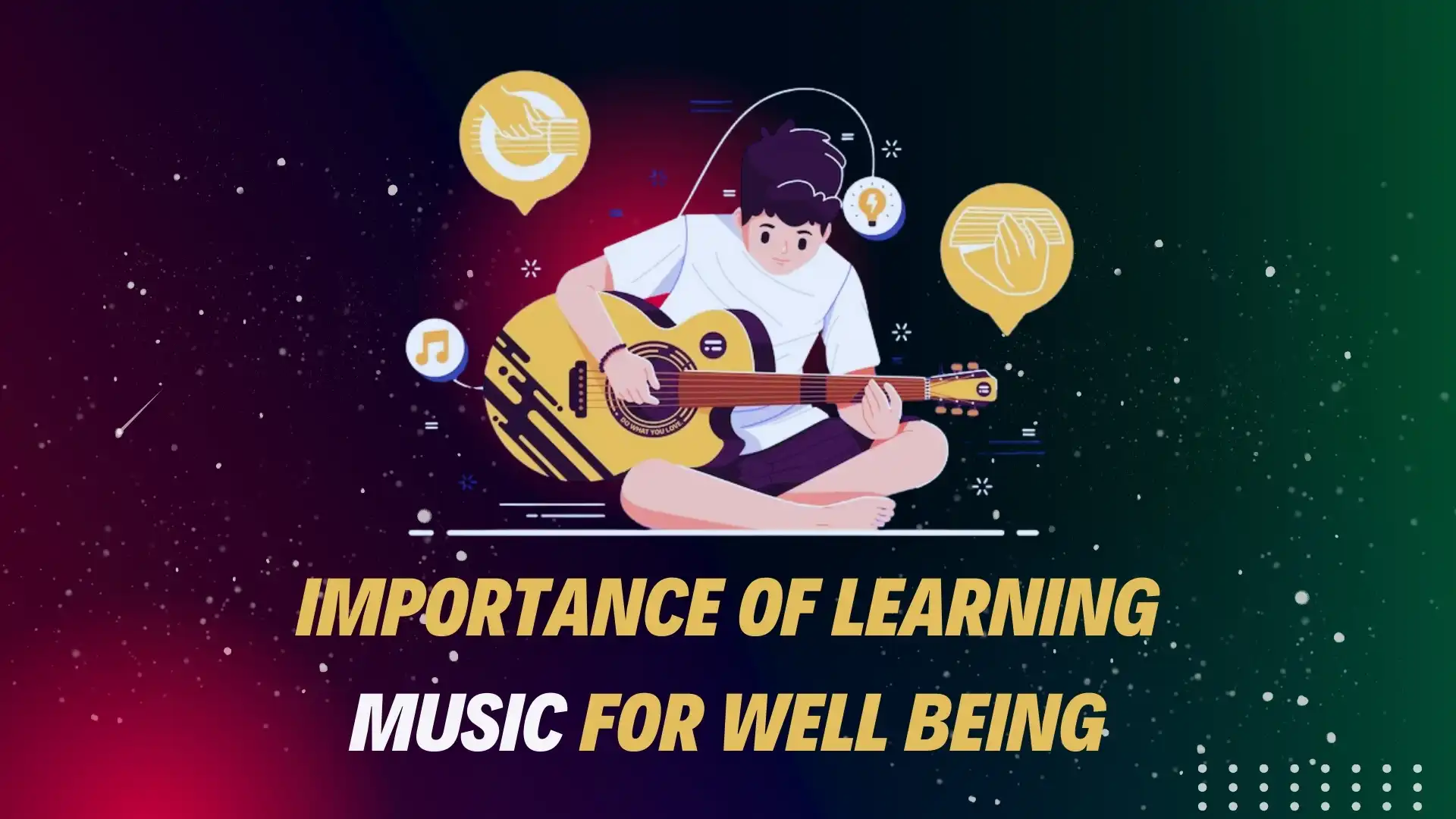- Why Learn Music?
- Advantages of learning music
- It helps boost the mind and relax the body
- Improved Coordination, Fine Motor Skills and Memory
- Music is effective in increasing the pleasure of education
- Becomes an outlet for creativity
- Voice of the Universe
- Helps deal with mental health issues
- Enhanced social interactions
- Music boosts our immune system
- Conclusion
- FAQs
Why Learn Music?
The importance of learning music are known widely across the countries. There have been arguments from the National Association for Music Education that states that all students must have access to learning music and they claim that proper music education benefits students thinking and helps individuals to succeed in all the spheres of their lives.
Besides, playing musical instruments is said to have multiple health benefits therefore emphasizing more on the advantages of learning music despite their age, skills, or profession. Music education programs for all ages are beneficial therefore, each individual must give it a try and surprise themselves with the amount of uniqueness it prevails in their perspectives.
Music being one of the universal languages of nature has its own set of advantages for humans making each life better. Let us unveil importance of learning music with the best eight reasons.
Advantages of learning music
It helps boost the mind and relax the body
One advantage of learning music education is relaxing our minds. There have been studies that shows benefits of learning music is it significantly reduce the levels of stress and anxiety by inducing peace within. There have been researches that show that listening to classical music before surgery has been helpful for patients and contributed to making them feel less anxious resulting in lower levels of the stress hormone cortisol.
Moreover, calm and relaxing music proves to help reduce blood pressure, heart rate, and stress levels and promotes feelings of well-being.
If you are thinking about How music education contributes to holistic development, then you must know that there have been many surveys also showing how playing musical instruments fuels the mind and boosts creativity which is further helpful in achieving innovations and making discoveries.
Closely paying attention to instrumental music provokes one to listen and tell a story about what one hears. Similarly, playing a musical instrument allows you to tell a story without words. Both require maximum right brain usage, which exercises not only one’s creativity but also their intellect.

Did You Know?
Playing music is not only enjoyable, for the ears. It also provides a great workout for the brain! Research has revealed that music education benefits student thinking abilities like memory, attention and problem solving.
Improved Coordination, Fine Motor Skills and Memory
Another importance of learning music is it improve coordination, fine motor skills, and memory especially while playing a musical instrument. A study published in the journal Frontiers in Neuroscience found that people who learned to play a new musical instrument improved working memory and executive functioning (the ability to plan, organize, and pay attention).
The study participants also showed increased activity in the hippocampus, the part of the brain responsible for memory.
A study published by the journal PLOS ONE recognized that people who had opted for music lessons had better fine motor skills and posed significant benefits of learning music for brain development than otherwise. Also, these individuals showed improved coordination between both their hands. Music education is quite important for children in enhancing creativity and developing emotional intelligence.
Encourage your child’s musical abilities with our diverse curriculum that fosters a lifelong passion for music combining creativity, with education to make every note a stepping stone in their journey!
Music is effective in increasing the pleasure of education
The society today overlooks the importance of learning music. However, music encourages pleasure and helps in reducing stress effectively. There have been studies that suggest that students who listened to music for 30 minutes before any exam felt more relaxed than students who did not, which proves that music education benefits students thinking. The stress levels were lower and there was a substantial increase in the feelings of pleasure.
Music helps to increase the retention of education much better than for students who did not opt for music therefore adding to the benefits of music education for children. It has multiple advantages and makes it a better choice to be included in the education niche.
Becomes an outlet for creativity
Turning music becomes an outlet for creativity and improves creative expression in a significant way. It is a way to express emotions, tell a story, create a mood, or anything that you might want. All that it needs is the willingness to create and experiment.
Music can be created in multiple ways by using instruments, voices, or any random objects. The role of music in enhancing creativity and expression is limitless.
Voice of the Universe
Music is believed to be made of vibrations and these vibrations form everything we see and observe. This theory is known as the vibrational theory of reality, according to which, music highly influences our thoughts, emotions, and physical being.
There is a belief that specific music can help us form a connection with the universe which on listening helps us raise our vibrations and achieve a healthier state of mind and body, thereby achieving peace and harmony.
Helps deal with mental health issues
Mental health issues are extremely common and most of the time lead to ineffective treatment methods. However, music therapy is an effective treatment for mental health conditions. Music therapy is a therapy that makes use of different music forms and helps in assisting the mental health conditions. Music therapy is an effective treatment for depression, anxiety, and PTSD.
Music therapy is an effective treatment as it largely helps to change the mood and state of mind of the person. Music therapy aids in reducing stress levels and provides a sense of calm. If you know someone struggling with some mental health condition, consider leveraging music therapy as a treatment option.
The role of music in promoting emotional well-being is vast and it is an instant way to uplift your mood and state of mind.

Music is, like a timeless symphony, where learning and harmony come together blending the strands of knowledge into melodies that touch the depths of our souls.
Enhanced social interactions
Music is a powerful tool that helps in enhancing social relationships. One benefit of learning music is that It helps in building bonds between people and creates a sense of community. Music assists in bringing people together and there are innumerable online platforms for music learning in the current scenario. For instance, singing together helps build harmony and unity.
Music expresses emotions and connects with others. Playing a musical instrument also facilitates enhancing self-esteem and confidence. Learning to play a musical instrument can be a great source of enjoyment and pride. Music can provide an outlet for creative expression.
Music boosts our immune system
Studies show a boost in the immune system and leverage the advantages of learning music for overall growth. This has been found through a study that proved listening to music has shown increased levels of immunoglobulin, an antibody that helps in fighting infection. The participants of the study also reflected higher levels of cells which were natural killers, a type of white blood cell that destroys viruses or cancer cells. The importance of music education in child development is also multitude in variance.
There are so many advantages of learning music and find how effectively music helps in reducing stress levels and improving mood. Stress is a factor that suppresses the immune system, therefore, reducing stress helps in boosting immunity. Music helps in the reduction of anxiety and pain in people with cancer.
Wondering how to enhance your immunity effectively, consider taking music as a help and take on to healthier ways.
Conclusion
Music is important and its vitality and impact of learning music on cognitive development are vast and have been mentioned enough in the research and surveys. The importance of learning music has been well encapsulated since our early childhood to later years and there are many different ways to incorporate music in our daily lives.
Get yourself enrolled in learning music at MusicMaster classes, invest in musical instruments, learn to play them, and listen to your favourite music at home. Different genres provide multiple benefits and the styles of music help you enjoy and seek all the best benefits. Happy listening!
FAQs
What advantages of learning music offer?
Learning music has benefits, such, as improving abilities promoting emotional well being fostering discipline and stimulating creativity.
What are some of the difficulties associated with learning music?
Mastering techniques, developing musicality and maintaining practice are among the challenges faced when learning music.
How does learning music contribute to development? What are its key advantages?
Learning music significantly contributes to development by enhancing abilities, fostering discipline, promoting creativity and cultivating emotional expression.
How does the study of music impact performance? Is there a correlation between musical education and success in other aspects of life?
Learning music can enhance performance by improving skills like memory and attention. Additionally it often correlates with success in areas of life due to its cultivation of discipline, creativity and problem solving abilities.
Where can I find resources to learn about the benefits of studying music?
Discover MusicMaster, for an exploration of the emotional and developmental advantages that come with learning music. This platform is backed by research findings, expert insights as real life success stories.
Related blog: Easy english songs to sing


























